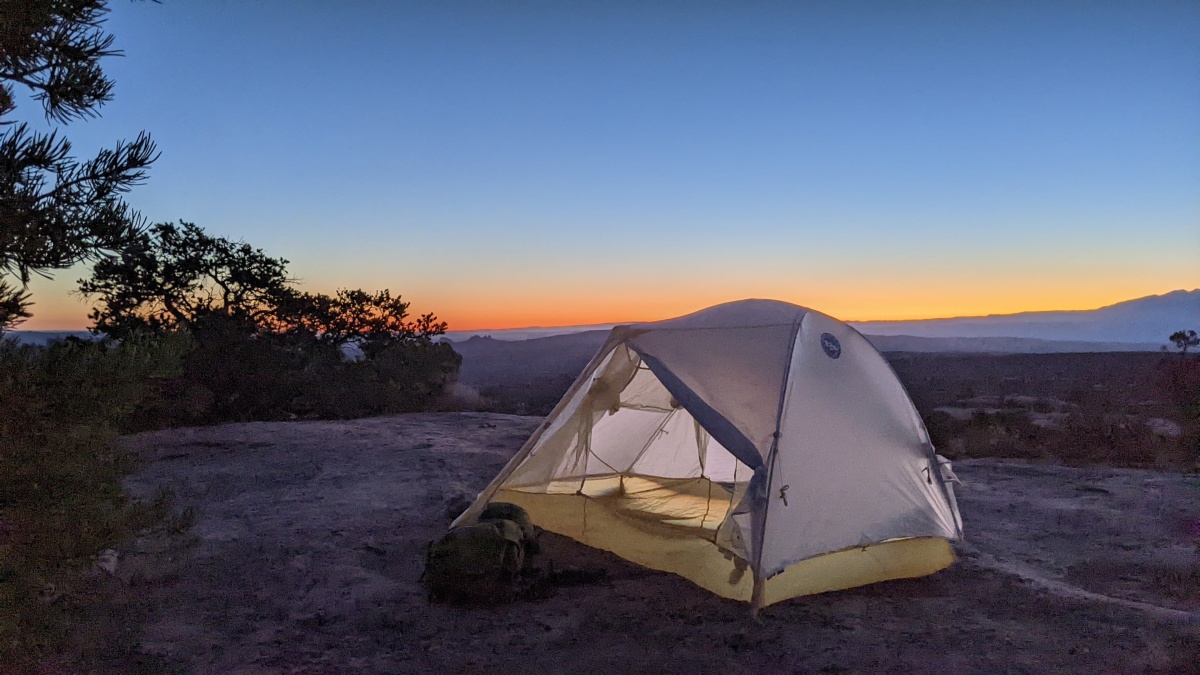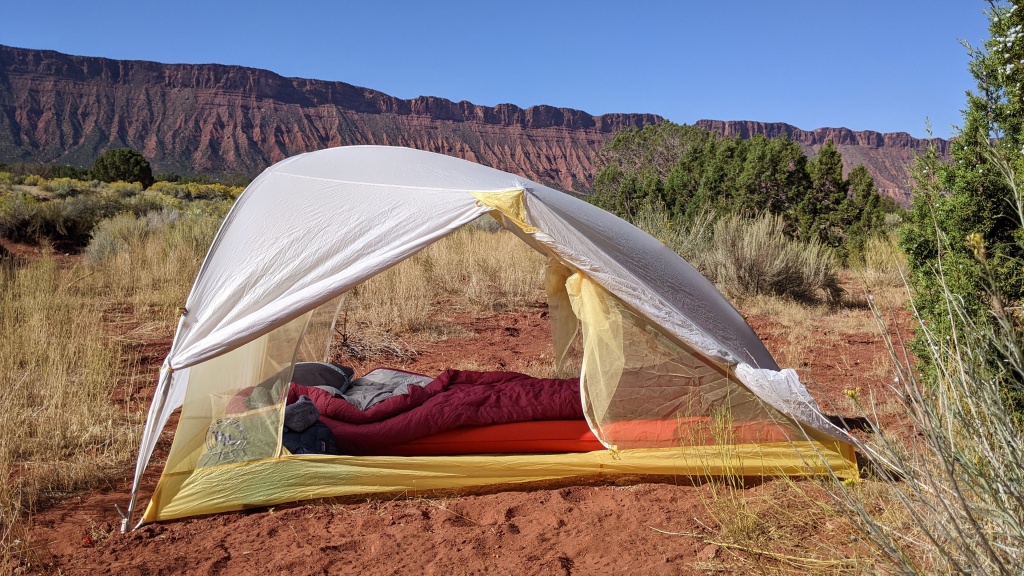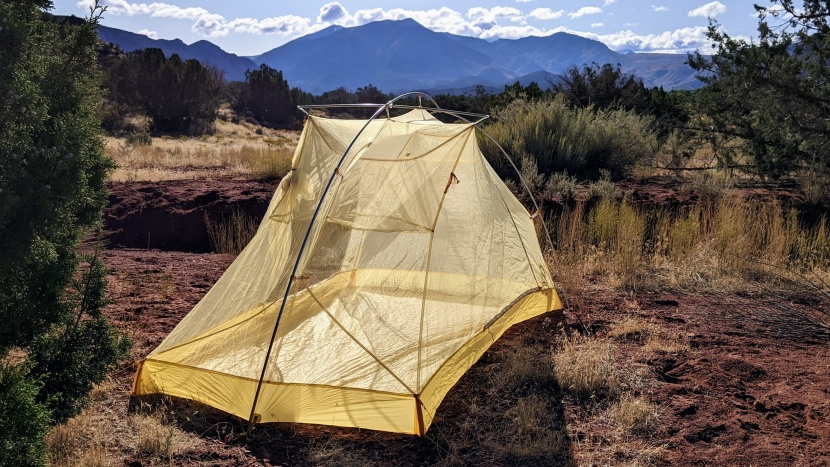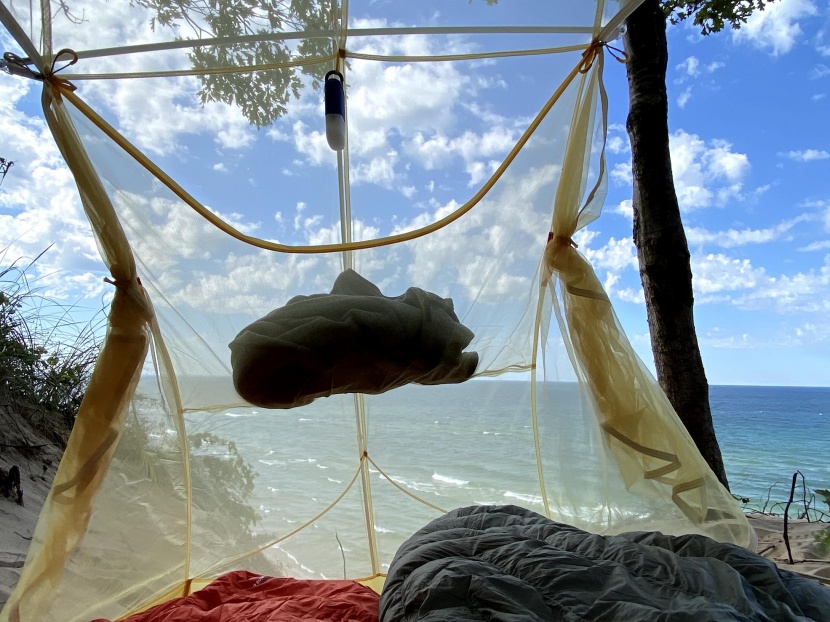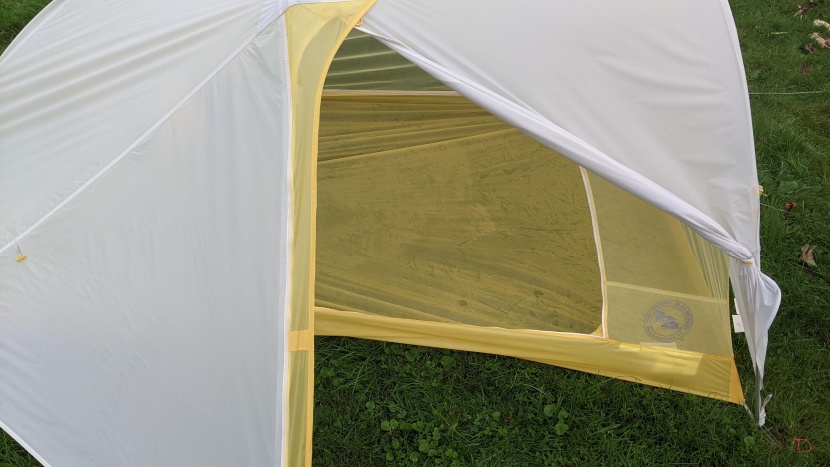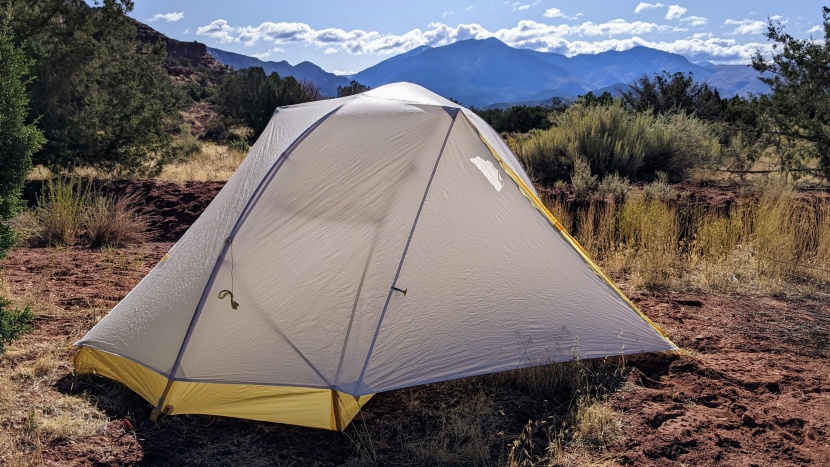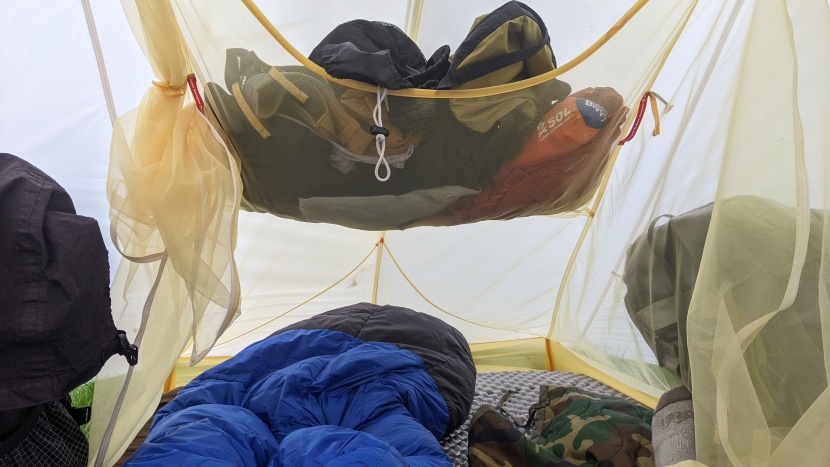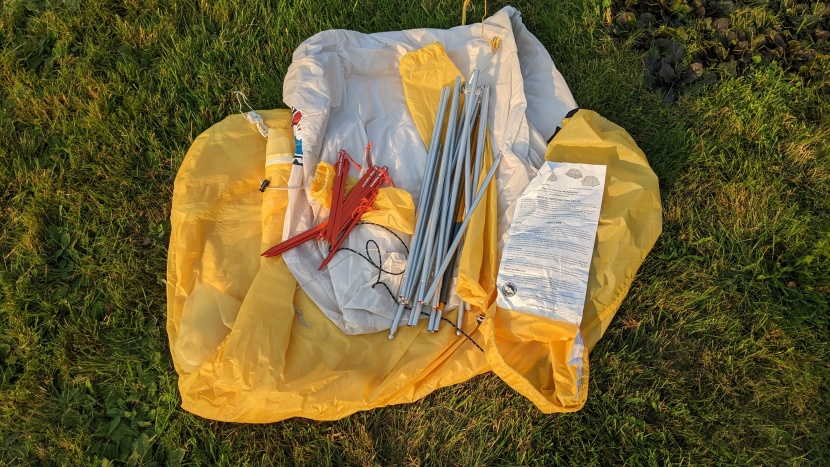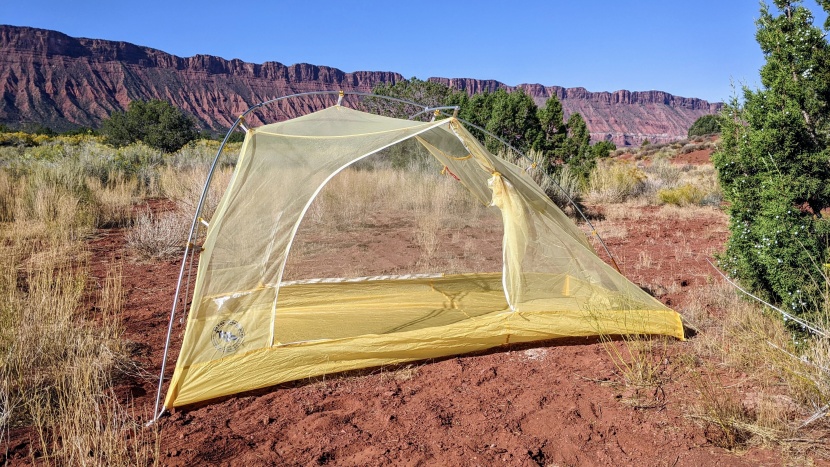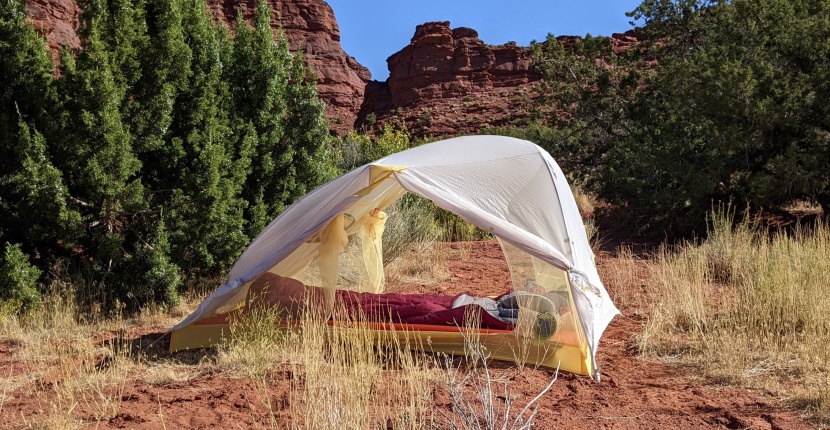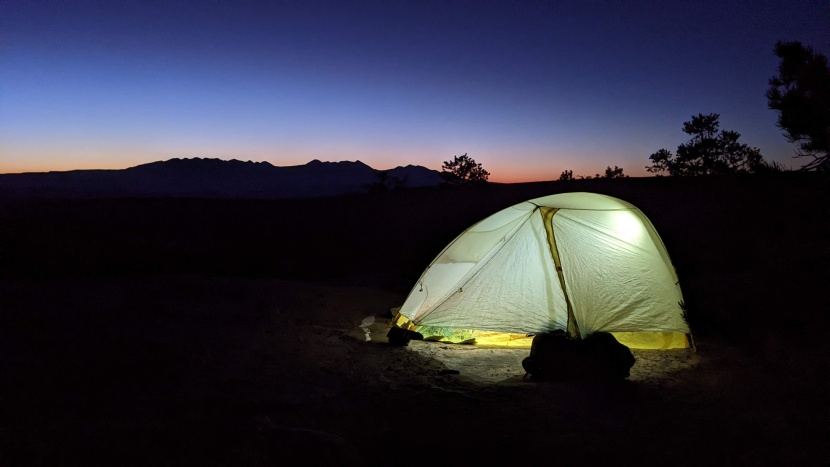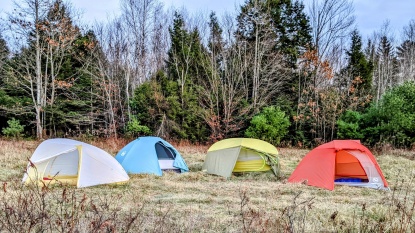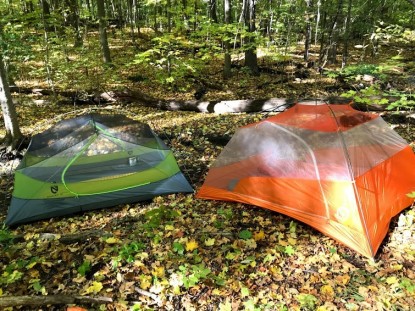
Our Verdict
Compare to Similar Products
 This Product
Big Agnes Tiger Wall UL2 Solution Dye | |||||
|---|---|---|---|---|---|
| Awards | Best Ultralight Option | Best Two-Person Backpacking Tent | Best Weight to Performance Ratio | Best Bang for Your Buck | Best On a Tight Budget |
| Price | $382.46 at Amazon Compare at 2 sellers | $560 List | $580 List $419.95 at Amazon | $289.00 at Amazon Compare at 3 sellers | $199 List $199.00 at REI |
Overall Score  |
|||||
| Star Rating | |||||
| Bottom Line | A super light tent that thrives over long distances in the backcountry | A tent with plenty of pockets and great interior volume all in a lightweight package | One of our favorite tents for all your backpacking needs, it boasts a delightful balance of comfort, water resistance, and weight | This comfortable, airy option can handle some abuse, though that durability adds weight | Simple and reliable in mild conditions, this is a good solid backpack tent |
| Rating Categories | Big Agnes Tiger Wal... | SlingFin Portal 2 | Big Agnes Copper Sp... | NEMO Aurora 2 | REI Co-op Trailmade 2 |
| Comfort (25%) | |||||
| Weather Resistance (25%) | |||||
| Space to Weight Ratio (25%) | |||||
| Ease of Use (15%) | |||||
| Construction Quality (10%) | |||||
| Specifications | Big Agnes Tiger Wal... | SlingFin Portal 2 | Big Agnes Copper Sp... | NEMO Aurora 2 | REI Co-op Trailmade 2 |
| Type | Two door semi freestanding | Two door freestanding | Two door freestanding | Two door freestanding | Two door freestanding |
| Measured Total Packaged Weight (lbs) | 2.48 | 3.34 | 2.99 | 5.51 | 5.65 |
| Dimensions (length x width x peak height) | 86 x 52/42 x 39 in | 85.6 x 51/42 x 44 in | 85 x 50/39 x 40 in | 84 x 52 x 44 in | 87 x 50 x 40 in |
| Measured Floor Area (sq ft) | 25.45 | 27.74 | 26.21 | 30.33 | 30.21 |
| Packed Size (length x diameter) | 17.5 x 6 in | 14.5 x 6 in | 20 x 6 in | 20 x (8 x 8) in | 18 x 8.5 in |
| Peak Height | 39 in | 44 in | 40 in | 44 in | 40 in |
| Interior Floor Area to Weight Ratio, sq ft per pound | 10.26 | 8.31 | 8.77 | 5.50 | 5.35 |
| Measured Headroom Area, sq ft | 7.75 | 13.24 | 12.72 | 25.28 | 4.86 |
| Interior Headroom Area to Weight Ratio, sq ft per pound | 3.13 | 3.96 | 4.25 | 4.59 | 0.86 |
| Vestibule Area | 16 sq ft | 8.4 + 8.4 sq ft | 18 sq ft | 9.2 + 9.2 sq ft | 19 sq ft |
| Number of Doors | 2 | 2 | 2 | 2 | 2 |
| Number of Poles | 1 | 3 | 1 | 1 | 2 |
| Pole Diameter | 8.7 mm | 8.7/9.3mm | 8.7 mm | 8.5 mm | 8.5 mm |
| Pole Material | DAC featherlight NFL aluminum | DAC Featherlite NFL | DAC Featherlite NFL | Aluminum | Aluminum |
| Number of Pockets | 4 | 7 | 4 | 4 | 2 |
| Guy Points | 3 | 12 | 4 | 4 | 4 |
| Gear Loft | No | No | No | No | No |
| Rain Fly Material | Ripstop nylon, PU coating (1200 mm) | 10D nylon 66 ripstop Sil | 15D 1200mm silicone nylon ripStop | 68D PU Polyester (1200 mm) | Coated polyester |
| Inner Tent Material | Ripstop nylon, PU coating (1200 mm), polyester mesh | 15D nylon mesh | Body: 10D polyester mesh, Floor: 20D nylon ripStop | 30D Polyester/ No-See-Um Mesh, 68D PU Polyester (1200 mm) floor Fly Fabric Polyester, |
Polyester/nylon |
Our Analysis and Test Results
Impressively light yet still feature-rich, the Tiger Wall UL2 Solution Dye is ready to go on long trips without weighing you down.
Comfort
Though it has smaller-than-average interior dimensions, this tent still comes with many of the creature comforts of roomier models. On paper, it's an underwhelming 86 inches long and has a tapered width (broader at the head than at the foot). However, when compared to other models that are under three pounds, the headroom in this tent is incomparable. The 39-inch peak height doesn't sound exceptional, but the wide pole configuration ensures that both sleepers have maximum headroom.
In addition, the Tiger Wall UL2 comes with a pair of side doors, one for each person. The storage pockets are also some of the most robust we have seen — not just for a compact tent but compared to any tent in the category. There are two standard side pockets for small items, but there's also an overhead media pocket and an absolutely massive “bin” that more or less performs the function of a sold-separately gear loft in other tents. We also appreciate the double vestibules. For a tent in this weight range, it's nice to have the extra space to keep boots and pack outside of the tent but still decently protected.
You can't totally escape the tight sleeping quarters. This is, after all, still an ultralight tent. Most nights, someone ended up pressed against the sidewall by the morning. However, it is still possible for two people to sit up simultaneously, which is more than can be said for other similar models. Unfortunately, the rainfly has no vent to let your humid exhalations escape. With two of you in the tent, this can lead to some condensation buildup.
Weather Resistance
The Tiger Wall does not offer as much weather protection as we like to see from a backcountry shelter. The tub floor only extends a few inches up the walls, making it more likely for the outside to find its way inside your tent — whether kicking up some soil as you get into the tent or watching some splashback from the rain make its way through the mesh.
That said, everything in this tent stayed dry during a rain test that lasted three days except for the underside of the fly. It was soaked with what we assume is condensation every time we checked. It never dripped to the floor of its own accord unless we were opening and closing the fly door or brushing against it. We've never had this experience with a tent before and found it bizarre. This is even more of an issue since the Tiger Wall is one of the few tents we tested that lacks a venting system in the fly. As a result, we do not recommend this tent for regular use in wet weather.
We also found mixed results in strong winds. Three guylines are included, one to support each pole. They help, but the pole structure, especially the single attachment point at the foot-end, doesn't fare well if you're being broadsided. We didn't experience any outright collapsing, but there is still a fair amount of flex to be found in a thunderstorm. You can try to minimize this issue by aligning the tent doors perpendicular to the wind.
On the plus side, the tent body is mostly mesh, which improves airflow. With that in mind, we found this tent best when we could roll the doors back completely. In addition, the fly door tieback is in an odd spot that we found to be a little too low, meaning that the door is liable to unravel and hang down, which is a bit annoying.
Space to Weight Ratio
The Tiger Wall UL2 is one of the lightest around. At two and a half pounds, it's a breeze for two people to carry. It is one of the few models in the category that comes in below three pounds and provides a lot of comfort per ounce. It has a measured floor area of 25.5 square feet, or 10.3 per pound. There is enough headroom to sit up in 7.8 square feet of it, or 3.1 per pound. Few of the lightest tents in the test do better.
The weight of the Tiger Wall is exactly what makes it ideal for covering long distances. With superlight stakes and a minimal number of pole segments, it's the best in its class while maintaining the security and protection that comes with a double-wall shelter.
With a packed size of 5.5 x 18 inches, this is one of the smallest tents in the category. Though the thin fabric is somewhat of a durability liability, it is especially compressible, and the hardware (i.e., clips and buckles) also don't take up a lot of space. The poles and stakes can fit easily down the side of a backpack or in an external water bottle pocket. We don't necessarily recommend actually carrying it this way, but the tent (or fly) packs down small enough that it can fit into an average-sized brain of a hiking backpack.
Ease of Use
This tent is simple to pitch. The body has unique pole-capture feet that are relatively easy to work with. All pole segments are connected with an elastic cord, making it really easy to snap each one into place. Two segments at the head are also color-coded to make it clear how to orient it to the tent correctly. We found it was possible for one person to set up in just a few minutes.
This is a semi-freestanding tent though, meaning that the structure of the tent's foot is held out by stakes. This makes it more difficult to pitch on hard surfaces like slickrock. We just use our gear or rocks in such a scenario. The stakes are a nice bright orange, which makes them easier to spot in the ground when it is time to pack up. They also have a bit of reflective cord, so you can see them at night with a headlamp. Tensioning the tent and fly is simple.
Entering and exiting the Tiger Wall can feel a bit awkward; the way the fly doors open, you can enter from the flap on the left or right. Neither aligns with the inner tent door particularly well, and they feel awkward. The inner door has two zippers, one along the bottom and one on the upper arch. They meet in the corner and are easy to find.
Construction Quality
The solution dye process makes for a longer-lasting tent, but the Tiger Wall still requires care on the trail. The material is resistant to UV fade, which happens to almost every tent over time. However, it is still a thin fabric that is susceptible to abrasion from gravel or sandy surfaces. We strongly recommend using a ground cloth or footprint beneath it to extend its life.
On the other hand, the clips and buckles are small and hardy enough that we don't have any concerns about stepping on and inadvertently cracking pieces. The DAC Featherlite poles feel sturdy and flexible when they are snapped together securely. One note is that the end of any segment will bear unnecessarily high stress and could snap if it is not completely connected to the adjacent pole segments.
There are also unexpected events to worry about. DAC Featherlite poles are popular among many tent models we've tested, and two sets broke. One was because of a hyper dog, and the other was because the wind picked up and threw the tent. So proceed carefully. The Tiger Wall comes with a splint for emergency pole repair, though it may not work. The split was too narrow to slide over the jagged edges of the two breaks we encountered. So don't count on it.
Should You Buy the Big Agnes Tiger Wall UL2 Solution Dye?
This tent is fantastic for those who want one of the lightest dedicated-pole tent options available. Still, we don't recommend it for consistently wet weather. It is light enough for one person but has just enough space for two people. For those who are willing to take good care of their equipment, the heftier price tag is certainly worth the investment. Though it's not the most durable tent in the category, it is on par with what we would expect for a tent of this type and quality to cost. Because of its cozy dimensions, it is not a great choice for casual car camping, but if you are planning to go on multiple week-long (or longer) hikes, it's hard to beat the combination of weight and comfort the Tiger Wall provides.
What Other Backpacking Tents Should You Consider?
If you love the features of this tent but prefer a little bit more space, its sibling, the Big Agnes Copper Spur HV UL2 or the Nemo Dragonfly Osmo 2, are both fantastic options. If you want to get even lighter, the Nemo Hornet Elite Osmo is the standard bearer for ultralight tents (though it is extremely tight for two adults). The MSR Freelite 2 is a bit lighter and roomier but has far less storage space and suffered some dampness in our rain testing.


